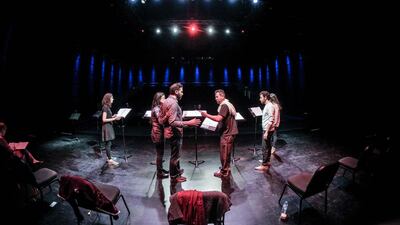'Everyone talks about the Middle East in generalities," says Catherine Coray, curator of the Arab Voices: Here/There/Then/ Now theatre festival, which ran in Abu Dhabi last week, "But theatre allows you to look at actual human stories."
Arab Voices brought together 17 Arab and Arab-American actors, playwrights and dramaturges for public readings at the NYUAD's Arts Center. It showed the range of voices in Arab theatre, from Amir Nizar Zuabi's heartrending reflection on the Syrian civil war in Oh My Sweet Land to Ismail Khalidi's Foot, a solo play about the Palestinian footballer Tareq Al Quto who was killed by Israel Defense Forces in 2006.
It was the first time a number of the plays had been performed in the Middle East and the migration of the works from their productions in the United States back to the Arab world became a live subject in the programme.
The Hour of Feeling tells the story of a young Palestinian academic who gives a lecture in London on the eve of the Arab-Israeli war in 1967. In Abu Dhabi, the actors, in a new translation, performed the Palestinian sections of the play in Arabic.
"It felt like coming home," says the Lebanese actor Hadi Tabbal, who played the lead role both in the New York production and in Arab Voices. "Though I'd always performed it in English, I'd thought the words in Arabic."
Also, in a question and answer section after the play, he said: “I felt the character could be more cocky in Arabic than in English.”
The use of Arabic for scenes of intimacy or even normalcy felt particularly pointed coming from a US theatre context where Arabic is often reserved for the language of the enemy. "I was thrilled by the reception of The Hour of Feeling," says festival co-producer Gaar Adams. "There are so few opportunities for Arabic plays to be staged, and for the play to be a cross-cultural experiment, where Arabic and English are performed together, was really great. You could tell how much it resonated with the audience."
In the question and answer section, audience members were quick to praise the translation for its attention to the Palestinian dialect – as well as to suggest nuances the Lebanese actors might have missed.
This reflection of diversity was another key motivation behind the three-day festival, which was three years in the making. “In the US, particularly after September 11,” Coray notes, “everyone from the Middle East became simply Arab.”
The works felt liberated by not having to represent Arabness for a foreign country. Aysan Çelik, a visiting professor on the NYUAD theatre programme who performed in Oh My Sweet Land and Food and Fadwa, says how, "in New York the conversation around Arab theatre is often about identity and authenticity. Here we were able to ask questions about language and personal relationships."
Çelik gave an astonishing performance in Oh My Sweet Land, a play written in 2014 where a Syrian woman living in Paris stalks a lover who has left her, following his trail from Paris to Lebanon to Jordan and into the war zone of Syria, walking in the dark through a watermelon field rank with the stench of rotting food.
Though its narrative is improbable, the play resounded with urgency. “We spent weeks interviewing Syrian immigrants in refugee camps,” says the work’s author, Zuabi, via Skype. “People should know these stories. And theatre is a vehicle for that.”
The atrocities Syrians have experienced – the husband who was brought back from the brink of death only to die in a hospital attack; the child whose hair was burnt off her head and her wounds infested with worms – were strung like horrible pearls along the story of the woman tracking her lover. After Çelik finished her performance, the air in the room felt thick and heavy even amid the applause.
The relationship dynamic in Oh My Sweet Land – between the Syrian woman who has been raised in Germany and her lover, an exiled member of the Syrian opposition – highlighted another theme of the programme: that of migration, or the gulf between what those who stay become accustomed to and what those who leave cannot imagine. This was the centrepiece of the rollicking family drama Food and Fadwa, probably the best-known play of the festival, in which a nephew returns from the US to the West Bank for his brother's wedding, bringing a cousin who left Palestine when she was young.
When the Israelis impose a curfew on the family she is astounded. “I’m an American citizen! I will not be told to stay inside!” she shrieks, to audience laughter. Meanwhile, the Palestinian members of the family go to their freezer to retrieve pastries stowed away for this eventuality.
“Never will you walk into an Arab home and not find pastries. Never! Absolute dishonour,” says the play’s central character, Fadwa, performed wonderfully by the work’s co-writer Lameece Issaq.
Like the Arab Voices festival itself, Food and Fadwa wanted to broaden the way in which people think about the Middle East: a place of comedy as well as tragedy; of return as well as migration; and where one of the most important things to a family is food.
Melissa Gronlund is a writer based in Abu Dhabi. Her book Contemporary Art and Digital Culture is published next month by Routledge.


